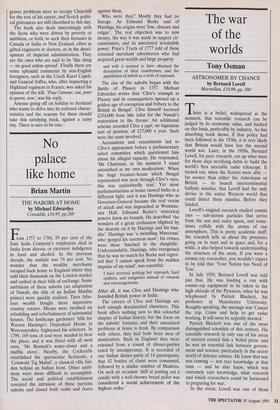No palace like home
Brian Martin
THE NABOBS AT HOME by Michael Edwardes
Constable, £16.95, pp.208
Fom 1757 to 1766, 59 per cent of the East India Company's employees died in India from disease or excessive indulgence in food and alcohol. In the previous decade, the statistic was 74 per cent. No wonder that the wealthy merchants escaped back home to England where they sold their diamonds on the London market and cashed in their bills of exchange. Some ambitions of these nabobs (an adaptation of Nawab, the title of an Indian Muslim prince) were quickly realised. Their fabu- lous wealth bought them impressive country estates. Means were lavished on rebuilding and refurbishment of substantial houses, The landscape gardeners' bills for Warren Hastings's Daylesford House in Worcestershire frightened his solicitors. In 1799, 169 tons of coal were needed to heat the place; and it was fitted with all mod cons, 'Mr Bramah's water-closet and a muffin stove'. Nearby, the Cockerells established the spectacular Sezincote, a `Cotswold Taj Mahal', a classical villa hid- den behind an Indian front. Other ambi- tions were more difficult to accomplish. The social and political establishment resented the intrusion of these parvenu nabobs and closed both ranks and doors against them.
Who were they? Mostly they had no lineage. As Edmund Burke said of Hastings, his origins were 'low, obscure and vulgar'. The real objection was to new money, the way it was made in suspect cir- cumstances, and its associated irresistible power. Price's Tracts of 1777 told of these returned merchant adventurers who had acquired great wealth and large property and with it seemed to have obtained the detestation of their countrymen, and the appellation of nabob as a term of reproach.
The rise of the nabobs began with the Battle of Plassey in 1757. Michael Edwardes writes that 'Clive's triumph at Plassey and its consequences opened up a golden age of corruption and bribery to the British in Bengal'. Clive himself received £234,000 from Mir Jafar for the Nawab's restoration to the throne. An additional scheme awarded Clive a jagir, an ingenious sort of pension, of £27,000 a year. Such were the sums involved.
Accusations and resentments led to Clive's appearance before a parliamentary select committee which questioned him about his alleged rapacity. He responded, `Mr Chairman, at the moment I stand astonished at my own moderation.' When the huge treasure-house which Bengal represented was seen through Clive's eyes, this was undoubtedly true. Yet most parliamentarians at home viewed India in a different light; and it was Hastings who as Governor-General became the real victim of attack and was impeached at Westmin- ster Hall. Edmund Burke's oratorical powers knew no bounds. He described 'the wonders of a great civilisation blighted by the descent on it by Hastings and his ban- dits'. Hastings was 'a swindling Maecenas' who 'gorged his ravenous maw'; his crimes were those 'hatched in the dunghills'. Understandably, Hastings, who recognised that he was no match for Burke and regret- ted that 'I cannot speak from the sudden impulse of my mind', was resentful: I have received nothing but reproach, hard epithets, and indignities instead of rewards and encouragements.
After all, it was Clive and Hastings who founded British power in India.
The careers of Clive and Hastings are well enough documented elsewhere. This book offers nothing new to this colourful chapter of Indian history; but the focus on the nabobs' fortunes and their associated problems at home is fresh. By comparison with others, they had both been men of moderation. Back in England they were released from a round of dinner-parties ruled by intemperance. It is recorded of one Indian dinner-party of 14 participants, that 42 bottles of claret were consumed, followed by a similar number of Madeira. On such an occasion 'skill at putting out a candle with a well-thrown bread pellet was considered a social achievement of the highest order.'


















































 Previous page
Previous page